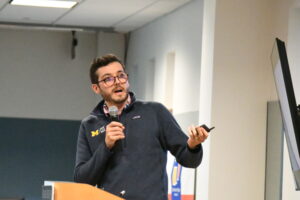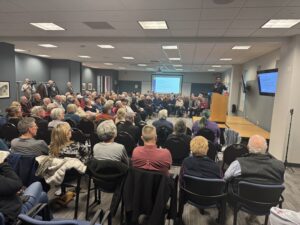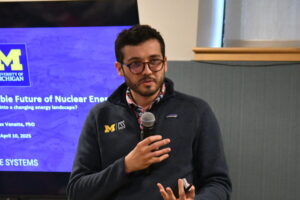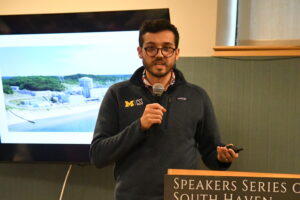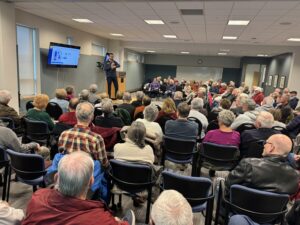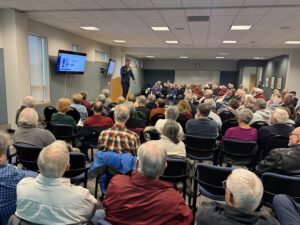
Thursday, April 10, 2025
by Dr. Max Vanatta
University of Michigan School of Environment and Sustainability
South Haven Speaker Series Focuses on the Risks and Rewards of Nuclear Power
In a presentation at Lake Michigan College, Dr. Max Vanatta underscored the risks and rewards of nuclear power. Emphasizing that nuclear energy is a valuable resource, Vanatta also spelled out the risks and challenges associated with nuclear power.
The topic of nuclear energy attracted an audience of more than 100 people on Thursday, April 10, 2025, at the South Haven Speakers Series’ first talk of its 11th season.
With the nearby Palisades Nuclear Power Plant scheduled for reopening within the next year, the current interest in a nuclear power plant retooling and reopening was evident by the size of the audience.
Vanatta, from the University of Michigan’s School for Environment and Sustainability, said in opening his presentation that the public perception of the use of nuclear energy has been largely shaped by high profile nuclear disasters. Reviewing the tragedies of Three Mile Island, Chernobyl, and Fukushima Daiichi, Vanatta said that these were not disasters of nuclear energy, but “they were disasters of policy, design and operation of these plants.” He went on to say that while he wasn’t minimizing the human toll of these disasters, “They are not unique to nuclear energy but are part of larger systemic failures.”
Explaining how nuclear energy works, Vanatta indicated that advances in building nuclear energy makes nuclear power plants safer than in the past.
He pointed out that the Palisades Nuclear Plant will be utilizing small modular reactors (SMRs). “SMRs are designed to be safe,” he said, adding, “preventing disasters was critical for SMRs design from the beginning.”
One of the advantages of SMRs, he said, is that “You don’t have to worry about on-site construction errors because they are all built in factories.” Furthermore, he said, SMRs are underground so there is much more containment of nuclear waste. Although SMRs are expensive, they haven’t been built yet, so, he quipped, “They are going to come in under budget – although they are very expensive.” Nonetheless, he added that SMRs are a great opportunity for the future.
Vanatta’s doctoral dissertation states that the U.S. has not yet deployed its first SMR due to high costs and complexity. However, new research from the University of Michigan suggests that SMRs could become economically viable by 2050.
Vanatta pointed out that costs for building conventional nuclear power plants have ballooned while he also indicated that licensing of nuclear power plants is an intensive process. He said that licensing is a very complex topic and while a rigorous process, “It is designed to ensure safety.”
During the question-and-answer portion of the evening, Vanatta was asked what there is about nuclear energy that keeps him awake at night. His response was not about the safety of nuclear power plants or the problems of disposing of nuclear waste. Instead, he said: “It’s how we are able to bring together all the different aspects of the system. We have all of these technologies and we have many options, but we just need to use them and connect with them. We need to connect the technology and the policies with the social systems around us.” — James Windell
———– Photos from the event —————
Watch the Video – Nuclear Power – Risks & Rewards by Dr. Max Vanatta University of Michigan School of Environment and Sustainability.
Video by Richard Brunvand
